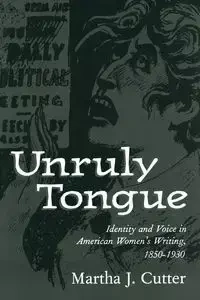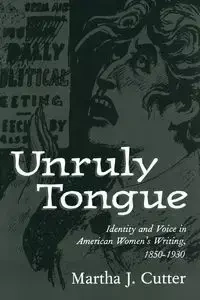Unruly Tongue - Cutter Martha J.
Unruly Tongue - Cutter Martha J.
- Identity and Voice in American Women's Writing, 1850-1930
EAN: 9781604731989
Symbol
629FEU03527KS
Autorzy
Cutter Martha J.
Rok wydania
1999
Elementy
252
Oprawa
Miekka
Format
15.2x22.9cm
Język
angielski

Bez ryzyka
14 dni na łatwy zwrot

Szeroki asortyment
ponad milion pozycji

Niskie ceny i rabaty
nawet do 50% każdego dnia
Niepotwierdzona zakupem
Ocena: /5
Symbol
629FEU03527KS
Kod producenta
9781604731989
Autorzy
Cutter Martha J.
Rok wydania
1999
Elementy
252
Oprawa
Miekka
Format
15.2x22.9cm
Język
angielski

In a society perceiving that language was for the province of male, white speakers, how did women writers find a voice? Martha J. Cutter answers this question by examining works by ten African American and Anglo American women who wrote between 1850 and 1930. She shows that female writers in this period perceived how male-centered and racist ideas on language had silenced them. By adopting voices that are maternal, feminine, and ethnic, they broke the link between masculinity and voice and created new forms of language that empowered them and their female characters.
With historical writings and with recent studies by feminist theorists, Cutter shows that the problem of language has been among the foremost concerns of American women writers. Such authors as Fanny Fern, Harriet Wilson, and Louisa May Alcott employed domestic voices that did not undermine constraining ideas of "women's speech." Later writers, including Anna Julia Cooper, Mary Wilkins Freeman, Charlotte Perkins Gilman, Frances Harper, and Kate Chopin, moved towards more unruly concepts of women's language. In doing so, they enabled such twentieth-century writers as Willa Cather and Jessie Fauset to create voices that work from within masculine and racist conceptions of language to undermine them.
The "unruly tongue" of nineteenth-century writing initiated an important shift in American culture and literature. It was a new kind of feminine voice that attempted to theorize and finally dismantle constraining views on women's speech. These writers challenged not only who has access to an enfranchised voice but also the larger power structures undergirding language itself. In so doing, they created a new frontier of language that breaks the silence of the centuries.
Martha J. Cutter is a professor of English at the University of Connecticut.
EAN: 9781604731989
EAN: 9781604731989
Niepotwierdzona zakupem
Ocena: /5
Zapytaj o produkt
Niepotwierdzona zakupem
Ocena: /5
Napisz swoją opinię

